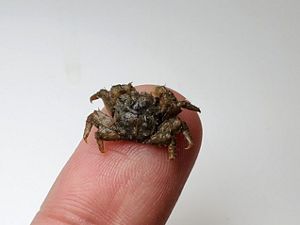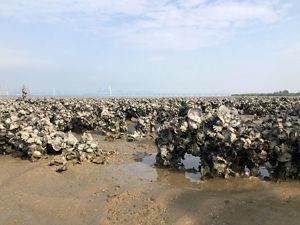New Research on Oyster Reefs by TNC and Partners
There is enormous potential for restoring lost oyster reefs, bringing significant environmental benefits.
Benefits of Oyster Reefs
Hong Kong was once home to thriving shellfish reefs, but due to a combination of factors including over-exploitation, coastal reclamation and pollution, shellfish populations have declined drastically in the past 150 years. In fact, shellfish reefs are the most endangered marine habitat on Earth. Restoring oyster reefs along urbanized coastlines can mitigate some of the environmental problems typical of coastal development, such as damage from storm surge and loss of biodiversity.
Quote: Marine Thomas
Most people associate oysters with food, but oysters create reef habitats that support coastal marine life. Only by restoring these lost habitats can we start to bring back some of the associated environmental benefits.
A primary benefit that healthy oyster reefs contribute to coastal environments is their role as natural water purifiers. New research produced jointly by The Swire Institute of Marine Science (SWIMS), Faculty of Science, The University of Hong Kong (HKU), and The Nature Conservancy (TNC), published recently in the scientific journal Restoration Ecology, found that just seven square meters of Hong Kong oyster reef can filter up to one Olympic swimming pool of water each day. In addition, a single Hong Kong oyster (Magallana hongkongensis, previously known as Crassostrea hongkongensis) can filter up to 30 liters of water per hour at summer temperatures, among the highest filtration rates recorded of any oyster species.
Even more importantly, oyster reefs provide habitat and nursery grounds for many native species that are otherwise lost from our shores. Another recent SWIMS study conducted in partnership with TNC found that these reefs house six times more species than bare muddy shores. The research found over 80 species on intertidal muddy shores in Deep Bay, 95 percent of which were found in oyster reefs, and almost 60 percent of which were exclusively found in those reefs.

Bright Future for Hong Kong’s Reefs
Demonstration of successful restoration in one of Asia’s coastal mega-cities can act as a model, providing evidence for the environmental and societal benefits of ecological restoration within the region.
In some parts of the world, oyster reef restoration has only been successful by transplanting juvenile oysters cultivated in hatcheries into the wild. However, this new research shows that natural recruitment of oysters in Hong Kong is high, meaning that restoration could potentially be achieved without the need for hatchery-reared oysters.
“We were excited to find high natural recruitment levels which suggests that oyster reef restoration is possible without hatchery intervention,” said Dr. Bayden D. Russell, an Associate Director of SWIMS and Associate Professor in the Research Division of Ecology and Biodiversity, HKU. “We think that this recruitment is because traditional oyster farming in the Pearl River Delta has maintained populations of native oysters in the system in spite of the loss of oyster reefs and these farms could potentially act as a source of larvae.”




